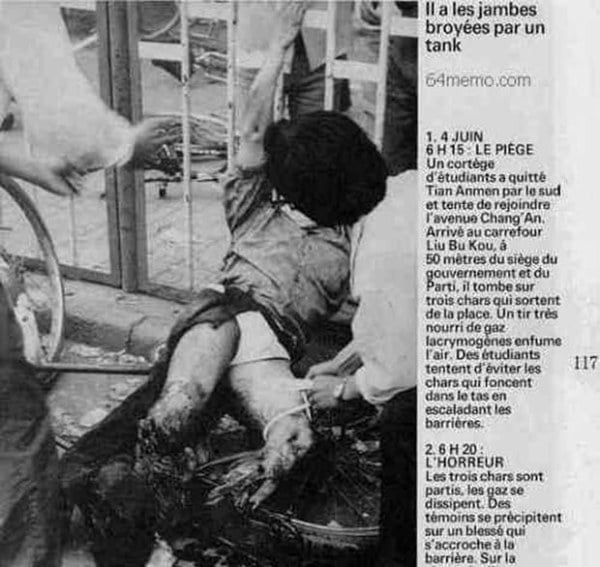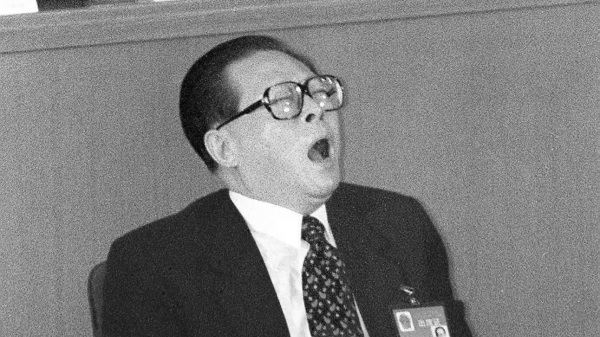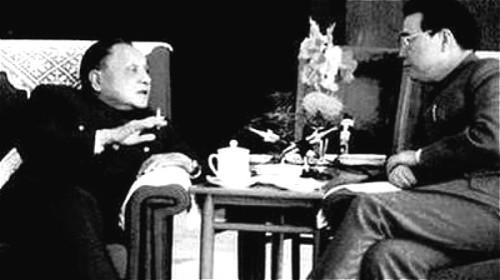
[ad_1]
in the CCPMember of the Standing Committee of the Political Bureauand members of the Politburo,Deng XiaopingOnly trust Li Peng. The picture shows Li Peng and Yang Baibing at the National People’s Congress meeting on March 21, 1992. (Image source: Getty Images)
The troubled publication of “Li Peng’s June Fourth Diary” in Hong Kong further proves the authenticity of this diary. The Hu Jintao authorities have been blockingLi Peng June 4thDiary, I believe one of the reasons is that according to the confidentiality standards set by the CCP, Li Peng’s diary has been leaked in large quantities.state secrets“.
In 1989, the Communist troops mobilized by Deng Xiaoping were blocked by the people and unable to enter Beijing. They finally entered the city in a concealed and disguised manner. Previously, these plots were limited to speculation. Now, through his diary, Li Peng revealed: There are indeed “underground civil air defense passages” in the area around the Great Hall of the People and Tiananmen Square. The Communist troops entered Tiananmen Square through these underground passages in a covert manner. “As of 3 a.m. on the 2nd, 25,000 people had entered the Great Hall of the People on the east side of Tiananmen Square, the Ministry of Public Security compound on the west side, and between Tiananmen and Meridian Gate on the north side. In the south, Beijing East Railway Station also had early arrivals from Shahe. The 3,000 troops have formed a situation of surrounding Tiananmen on all sides. ”
Li Peng recorded in detail that during the student unrest, high-level meetings were held at Deng Xiaoping’s home many times to confirm the accusations of the petitioning students: Deng listened to politics behind a curtain. In 1989, as the de facto supreme ruler, Deng Xiaoping’s approval rate among the Chinese people outside the Forbidden City was close to zero; but inside the Forbidden City, within the small circle of senior CCP leaders, his power was still overwhelming. Overwhelming Party General Secretary Zhao Ziyang. The completely opposite political atmosphere inside and outside the Forbidden City reflects the abnormal ecology of Chinese politics.
Li Peng also confirmed that it was Deng who proposed the movement of troops into Beijing and who made the decision to clear the area (suppression). After Deng mobilized the troops, he probably did not expect that the troops would be blocked by the people and unable to enter the city. During this period, Deng was worried, and he was most worried about “the instability of military morale.” Li Peng wrote: “Deng Xiaoping was worried about the instability of military morale. This was a big problem.” After the “June 4th” massacre, Deng did not show up until June 9, the fifth day after the massacre. Seeing that the situation was completely under control, Deng Cai made an appearance and met with cadres of the martial law troops.

Fang Zheng, a student at the Beijing Institute of Physical Education, lost his legs after being run over by a tank in Liubukou in the early morning of June 4. (Image source: Free image June 4th archive photo)
What is intriguing is that Li Peng’s diary disclosed for the first time what Deng said when he met with cadres of the martial law troops: “If tanks are used to run through the crowd, it will cause confusion about right and wrong across the country.” In fact, “June 4th” One of the main plot points in the massacre was the Communist army’s use of tanks to crush the crowd. Fang Zheng, a fourth-year student at Beijing Institute of Physical Education, testified that on the morning of June 4, Fang Zheng and other students evacuated from Tiananmen Square. When they were marching to the Liubukou area, three tanks of the Communist Army rushed into the crowd from behind the student team. Fang Zheng was killed on the spot. The tank crushed both legs. After the three tanks drove away, 11 mutilated corpses were left at the scene.
Deng’s words are like “There is no three hundred taels of silver here”, deliberately reversing the facts and confusing right and wrong, and embodying the dark skills of a dictator who lies to his face without blushing.
Regarding the process before and after Jiang Zemin became general secretary, Li Peng recorded: First, Chen Yun and Li Xiannian recommended it to Deng Xiaoping. Deng made a formal decision on May 19 of that year and informed Li Peng and other “Standing Committee members.” On May 31, Jiang Zemin was summoned to Beijing again; on the morning of June 1, Deng informed Jiang face to face that he was asked to serve as General Secretary. However, Jiang did not agree to take over immediately. Citing “the provisions of the Party Constitution” as an excuse, he tactfully expressed his request that “he be elected by the Central Committee as General Secretary.” It was obvious that under the circumstances at the time, it was impossible to do so in a short time. The “Central Plenary Session” was held.

On March 5, 1998, Jiang Zemin gave a government report to Li Peng. (Image source: Getty Images)
Jiang took the opportunity to propose: “Before this, he cannot speak to the outside world in the name of General Secretary. He can first take on part of the work in the Central Committee and become familiar with the situation of the Central Committee.” It can be seen that Jiang is using delaying tactics. In fact, Jiang is still watching. On the one hand, within the party, the dispute between Deng and Zhao has not yet reached a final conclusion; on the other hand, the Communist army’s march to Beijing has been blocked, and it is still unclear who has the upper hand between the army and the people, and whether the morale of the military has changed. Jiang insisted that Li Peng was still in charge of frontline work. Li Peng recorded, “He has always asked me to preside over the work of the central government on the front line.” When the massacre unfolded, Jiang stayed in the guard building and watched the situation. It was not until everything calmed down that on June 23, at the Fourth Plenary Session of the 13th Central Committee of the Communist Party of China, Jiang officially became General Secretary. Li Peng’s diary implies that Jiang Zemin is a slippery man who makes decisions based on the prevailing circumstances.
Li Peng’s diary shows that many times, Li Peng alone was pushed to the front desk. In fact, after the “June 4th” massacre, in the early morning of June 5, only retired old man Wang Zhen accompanied Li Peng to the Great Hall of the People to visit the Communist troops who participated in the massacre. officers and soldiers. It was not until Deng Xiaoping’s appearance on June 9 that other senior CCP figures and elderly people appeared together with Deng (only Jiang Zemin still refused to excuse himself).
Li Peng’s diary also indirectly confirmed the fact that Yang Dezhi and other seven generals wrote letters opposing the suppression; Li Peng’s diary also revealed that in the late stage of the student unrest, even though a central “propaganda group” headed by Jiang Zemin was formed, after the “June 4th” massacre, “radio and None of the TV stations sided with the party and the government.”
Regarding the 1989 democracy movement, someone once reflected: “The students did not cherish the opportunity to dialogue with the government and messed up the matter.” However, Li Peng’s diary revealed that regardless of whether the students had a good dialogue with the government, the government was determined to suppress it. On May 18, Li Peng and others pretended to have a dialogue with the students, but on the first day, that is, May 17, the top leaders of the CCP made the decision to mobilize troops to Beijing and implement martial law at Deng Xiaoping’s home; Li Peng recorded that after In the student dialogue, “I also left a foreshadowing. I said, I will not hide my opinions. I will “We will fully explain the government’s position at the appropriate opportunity. This refers to the meeting of party, government, and military cadres that will be held tomorrow.” On the next day, May 19, at the “mobilization meeting of party, government, and military cadres in the capital,” Li Peng made a murderous speech. In his speech, he shouted sternly: “Resolute and decisive measures must be taken to quickly end the unrest.”
The biggest “state secret” leaked in Li Peng’s diary is that all senior figures of the CCP and the heads of various localities and ministries expressed their opinions on Deng and Li’s joint efforts to mobilize the military to impose martial law. Many of them agreed (some hesitated, some expressed implicitly) Disagree). This plot was exposed through Li Peng’s diary. It seems that the “June 4th” massacre in the city back then is now related to all the princes in Zhongnanhai and everyone is responsible. In view of the fact that after the June 4th Incident, Zhongnanhai was dominated by hardliners and the reformists were wiped out. Therefore, Hu Jintao and others decided to prevent Li Peng’s diary from being published publicly.
However, this major “state secret” regarded by Li Peng as a “talisman” left a loophole: after Deng and Li made the decision and action to mobilize the military to impose martial law, other senior CCP figures, as well as the heads of provinces, cities, and ministries Even those who support it only expressed support for martial law, and did not express support for the army to shoot at people, use tanks to crush people, or even massacre cities on a large scale. If those in power in Zhongnanhai today or in the future intend to overturn the verdict, they can still rely on this loophole to put all the responsibility for the massacre on Li Peng and the dead Deng Xiaoping.

It was most likely a secret order issued by Deng and Li. Otherwise, how could the Communist officers and soldiers who came from afar be so bold as to act without authorization? (Picture source: Internet picture)
In fact, there are many secrets in Li Peng’s diary, and the most concealed one is the secret exchange between Li and Deng. At that time, except for Li Peng, Deng Xiaoping did not trust or fully trust anyone else in the Standing Committee of the Political Bureau of the Communist Party of China and the Politburo members. Many decisions, explanations, and deployments were most likely only between Deng and Li. This included allowing the communist army to shoot at the crowd, use tanks to crush the crowd, and use poison gas bombs. It was most likely that Deng and Li gave the secret order behind the backs of others. Otherwise, how could the Communist officers and soldiers who came from afar be so bold and act without authorization?
Editor in charge: Fu Longshan
Short URL:
All rights reserved. Reprinting in any form requires permission from this site. It is strictly prohibited to create mirror websites.
[Honorary Members Wanted]Streams can merge into the sea, and small kindnesses can achieve great love. We sincerely recruit 10,000 honorary members from Chinese people all over the world: each honorary member only needs to pay a subscription fee per year and become an honorary member of the “Look at China” website, which can help us break through censorship and blockade and provide services to at least 10,000 mainland Chinese compatriots. Provide independent and true key information to warn them in times of crisis and save them from pandemics and other social crises.






